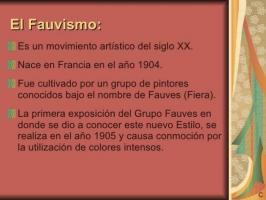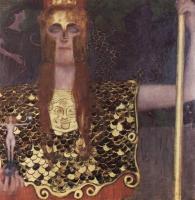Main representatives of scholasticism in philosophy
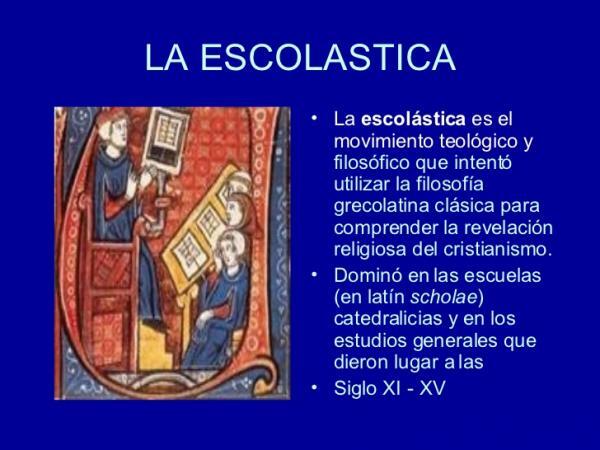
Image: Slideshare
We will dedicate this lesson from a TEACHER to main representatives of scholasticism in philosophy. This theological philosophical current develops from the year 1100 to 1700, and consists of a combination of the platonic philosophy Y aristotelian with the truth of the christian revelation that is, with the teachings of the Holy Scriptures. The word scholastic, derives from the Latin scholasticus, which comes from the Greek σχολαστικός, which can be translated as "belonging to the school" and was the predominant current throughout the Middle Ages. The central theme of scholastic philosophy revolved around the relationship reason and faith and the problem of universals. If you want to know more, continue reading this article.
We said that the main concern of scholastic philosophy was the relationship between reason and faith, or what is the same, between philosophy and theology, next to the problem of universals. Well, all this will be treated in different ways by the main representatives of this current, which breaks with the scientific thought in favor of the truth of Christian revelation, although it is true that they advocated logical and discursive.
Scholastic thought is an attempt to conciliate reason and faith, and thus establish between the two a dependency ratio by which, the first, will always be subordinated to the second, which can help to understand its truths, the wisdom of Christian revelation, but in no case replace it.
The main representatives of medieval philosophy are the following:
- XI-XII century: Saint Anselm, Pedro Abelardo, Roscelino, Averroes, Maimonides...
- XIII century: Saint Thomas Aquinas, Saint Albert the Great, Roger Bacon, Saint Bonaventure, Duns Scotus, Henry de Ghent.
- XIV century:William of Ockham. End of scholasticism.
Below we will explain in more detail the main representatives of scholasticism in philosophy.
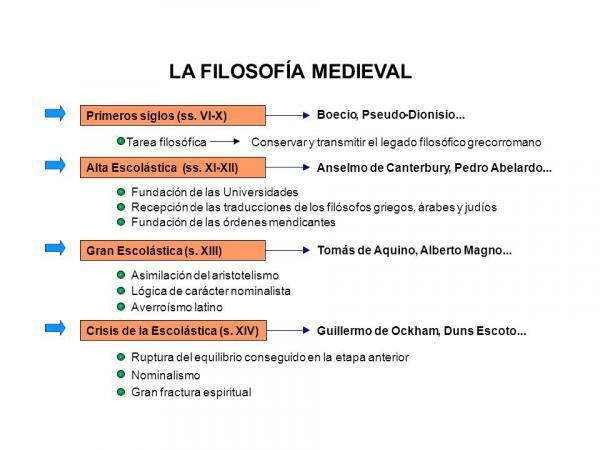
Image: SlidePlayer
Here we leave you a complete list with the names of the representatives of scholasticism in philosophy so that you can better know their contribution in the history of philosophy.
1. Juan Escoto Eriúgena (815-877)
His main contribution to the history of thought is the creation of the first medieval philosophical system, in addition to having translated the works of the Neoplatonic Dionysus the Areopagite into Latin. Eriugena. This philosopher refused to allow his works to be censored, so he faces Pope Nicholas I. On the other hand, Eriúgena affirms that there is no condemnation, in front of tradition and that all human beings will go to heaven after death.
2. Saint Anselm of Canterbury (1033-1109)
Anselmo was born in Aosta, of a wealthy family, he was appointed Archbishop of Canterbury by the King of England, William I the Conqueror, and during this time, he decides to start writing his works, to translate his thoughts and his teachings into his writings. In the year 1077 he wrote Monologium, a work that reflects the influence of Saint Augustine and in it he describes God as the most supreme Being, while discovering his attributes. In the year 1078, he writes Proslogium (1078). In this book he writes his famous ontological argument to prove the existence of God, the greatest being of all beings, and above him there is no one. Since it is impossible to think of the existence of a being more superior to God, therefore, God has to exist.
3. Pedro Abelardo (1079-1142)
Philosopher and theologian born in Le Pallet (Brittany), who studied with Roscelino, a nominalist philosopher and with the William of Champeaux, a realist, although later he was critical of those who had been his teachers. In the year 1121 he published his first work, a treatise on the Trinity (1121), a work that was condemned and Aberlard, forced to leave Saint-Denis-en-France. Thus, the philosopher founded his own chapel, the Paraclete, and a little later he was named abbot of the Saint-Gildas-de-Rhuis monastery. In the year 1132 he wrote his autobiography, Historia Calamitatum (History of my misadventures, 1132). Also during this period is when he writes his famous letters to Heloise, a classic of romantic literature. The two were buried together in the chapel of the Paraclete.
4. Saint Bonaventure (1217-1274)
Christian theologian and general vicar of the Franciscans, defends a good part of Aristotelian physics, but rejects its metaphysics, considering that it went against the Christian faith. All of his work will focus on the problem of the soul and enlightenment, as well as the soul's relationship with God. Among his most outstanding works are,Itinerary of the mind towards God, which he writes in the year 1259 and the mystical treatises of him.
5. Saint Thomas Aquinas (1225-1274)
He is one of the most important figures in scholasticism. He studies the philosophy of Aristotle and the Averroists, which he tries to reconcile with the philosophy of Saint Augustine. Regarding the relationship between reason and faith, the philosopher will defend that there is a dependency, a subordination of the first to the second (subordination of philosophy to theology and of the church to condition). Because although reason can help faith to understand some truths, some, like the Trinity, only be known through revelation. He will defend a moderate realism against the extreme realism predominant at the time, but he defended the existence of universals against nominalism and conceptualism.
6. Juan Duns Escoto (1266-1308)
Scottish theologian and philosopher, creator of his own school and author of his most important writings Comments on the Judgments Y Quodlibetic issues, where he analyze the concepts of causality and possibility, in order to demonstrate the existence of God. This thinker affirms that theology and philosophy, although independent, complement each other, since the second can help the first.
7. William of Ockham (1285-1349)
English philosopher and theologian and scholastic theologian, and the chief representative of the nominalist school, and will deny the possibility of demonstrating the existence of God through reason, since it is only demonstrable through reason. divine revelation. He supposes a total break between reason and faith, between philosophy and theology. The principle known as "Ockham's razor", or principle of economy, is attributed to him, which rejects the unnecessary multiplication of entities. With Ockham, begins the decline of scholastic philosophy and the beginning of the modern age.
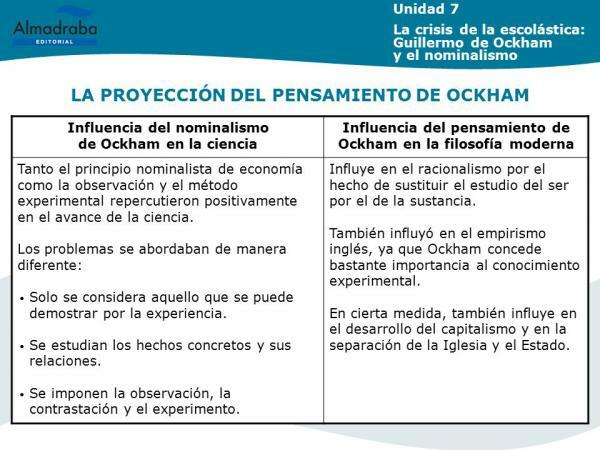
Image: SlidePlayer


